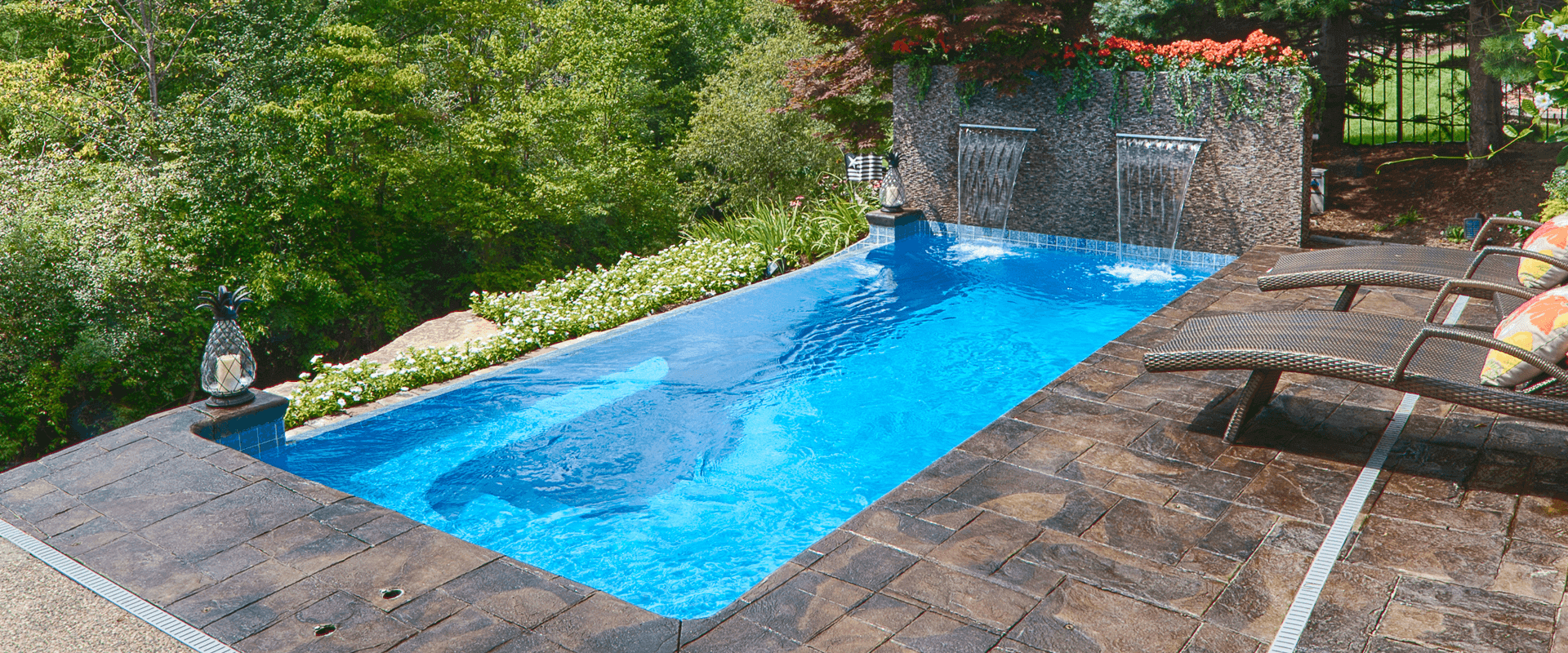877-929-7665
Is a Fiberglass Pool Shell Right For Your Pool?
If you are looking into buying and researching inground pools, you have likely discovered that pool forms are made of concrete, vinyl-liner, or a fiberglass pool shell. In this post, we’ll take a closer look at fiberglass pool shells so you can determine if one may be right for you.
What is a fiberglass pool made of?
Fiberglass has become a well-known material in the past 50 years. It’s used to make boats, automobile parts and, of course, pools! Fiberglass material is quite literally fibers of glass. In the manufacturing process, fiberglass is flexible and thin, almost hair-like. Unlike hard, solid shards of glass, fiberglass doesn’t shatter or cut you because the fibers are heated until they’re molten and become a sticky, gooey texture. It is then forced through superfine holes that create glass filaments that are so thin that they are measured in microns.
These thin threads of fiberglass are woven into larger swatches of material. For strength and durability, a fiberglass pool shell is made of more than fiberglass. What makes the material even stronger than metals by weight is the thermoplastic polymer resins that are added.
Through years of testing and our commitment to continuous improvement, Thursday Pools has developed durably-crafted composite pools. We’ve gotten our fiberglass pool shell recipe just right by manufacturing it in multiple layers of the best available ingredients.
We take quality and durability seriously. To assess precisely how many layers of strength are needed throughout high-stress points and each area of the pool, our engineers conducted finite element analysis (FEA). The results affect how many layers of the following ingredients will be required throughout the pool shell.
- Gel Coat
Our pool surface gel coat is designed to last and look luxurious. It’s smooth, resistant to algae, and a dog’s claws won’t cause a scratch. Thursday Pools uses a high-quality gel coat so you can feel confident in your purchase, knowing that your pool surface is one of the most tested and reputable on the market. - Vinyl Ester Resin Barrier Coat
Our vinyl ester resin barrier coat helps enhance the longevity and performance of the fiberglass structure by providing an additional layer of protection against moisture and chemical degradation. Our vinyl ester barrier coat prevents potential blistering and protects the surface finish of your pool. - Chopped and Hand-Laid Fiberglass
For several pool layers, fiberglass is combined with 100 percent isophthalic polyester resin and no fillers. This type of resin is used where strength and durability are a must. Despite the costs and time involved, Thursday Pools uses both equipment-applied chopped fiberglass and hand-laid applied fiberglass to achieve the optimal physical properties that a best-in-class fiberglass pool requires. - Custom Stitch Mats
Our hand-laid stitch mats provide additional strength, stability, and reinforcement. The stitching helps hold the fibers in place, preventing them from shifting or becoming misaligned, enhancing the pool shell’s structural integrity and impact resistance.
Honeycomb Core
Thursday Pools uses a honeycomb core structure to add vertical and horizontal supports throughout the pool. This construction technique applies to all horizontal surfaces above the floor, such as steps, benches, and tanning ledges. It is also reinforced in vertical strips along the pool wall.
Should I buy a fiberglass inground pool?
Fiberglass pool shells are beautiful, durable, and even somewhat flexible, making them more able to withstand weather conditions and ground movement. The malleability of fiberglass also allows us to create unique features such as sun shelves, tanning ledges, benches, swim-outs, steps, and even a zero entry. Here are some other questions to ask:
- What shapes and sizes do fiberglass pool shells come in? We manufacture a variety of fiberglass pool shapes to fulfill your backyard dreams. We craft our pools to fit how our customers use them the most—rectangle, freeform, big, and small. We have a pool for every personality and yard type! Our smallest pool (the sea turtle) is 9.5′ x 19.5′ and 4’6″ deep while our biggest pool (the Goliath) is 16′ x 41′ and 6’8″ deep. Plus, we build just about every size in between.
- How long do fiberglass pools last? Can a fiberglass pool last 50 years? Yes! Fiberglass pools will last well over 50 years if you get it through a reputable manufacturer that uses high-quality materials and if the installation is done properly. We inspect each pool shell thoroughly before shipping it out and only distribute our pools through our dealer network to ensure proper installation.
- If anything were to go wrong (and we hope it doesn’t), we’ve got you covered! Our 15-year surface warranty will warrant the surface of the pool from osmotic blistering. And our one-time transferable 35-year structural warranty protects against any leak due to structural failures caused by workmanship and material used in the manufacturing for the lifetime of the pool.
- Are fiberglass pools affordable? When shopping for a fiberglass pool, how much do fiberglass pools cost? is probably one of the first questions you’ll ask. The cost of a fiberglass pool will vary depending on your particular project, pool size, and even where you’re located. That said, the average cost of an inground pool is $45,000 – $65,000.
Every inground pool install is unique. There may be hidden cost factors that you will need to consider, such as site preparation, access, permits, fencing, restoration, electrical, and dirt hauling. Click to get an estimate, or try using our pool cost calculator. It will give you a ballpark figure based on the size of the pool and other items that are unique to your project. For more information, contact a dealer in your area!
